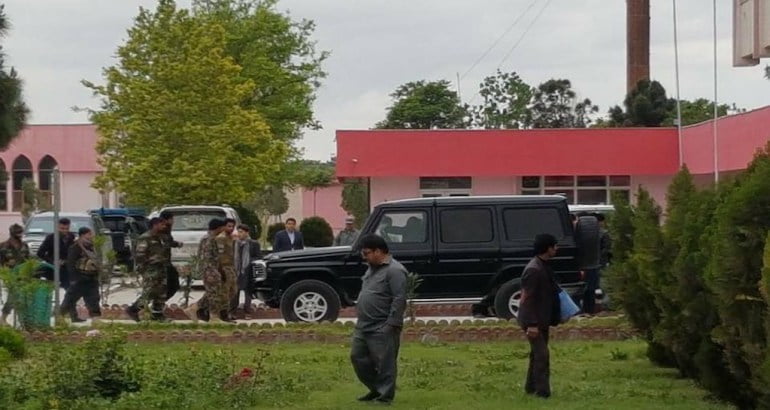Gulen-inspired school raided by Turkish diplomats, Turkish soldiers in Afghanistan

Date posted: April 18, 2018
A group of Turkish diplomats led by Turkish Consul General Şevki Seçkin Alpay together with dozens of Turkish soldiers and Afghan military police officers raided an Afghan-Turk school in Mazar-e Sharif, northern Afghanistan, on Tuesday.
The armed group, accompanied by the Turkish Cooperation and Coordination Agency’s (TİKA) Mazar-e Sharif coordinator, Zeki Budak, attempted to illegally take over the administration of the school. However, they encountered strong resistance from parents of Afghan-Turk school students, who refused to allow the group to take control of the school.
According to eyewitnesses, a group of parents resisted the intruders and shouted, “There’s no place for thieves here!” while the school’s garden filled with armed soldiers and military vehicles. The school was reportedly surrounded by military police and the Turkish diplomats’ armed guards. The diplomats and military police were ultimately unable to take over management of the school and hand it over to the Maarif Foundation as planned.
The controversial Maarif Foundation was established by the Islamist Turkish government led autocratic Turkish President Recep Tayyip Erdoğan after a July 15, 2016 coup attempt in Turkey to take over the administration of overseas schools allegedly linked to the Gülen movement. To date, it has taken control of dozens of schools established by volunteers of the Gülen movement in such African countries as Somalia, Guinea, Niger, Sudan and the People’s Republic of Congo.
The raid in Mazar-e Sharif came just a week after an official visit by Turkish Prime Minister Binali Yıldırım to Kabul, whose top agenda item was reportedly to assure the transfer of the Turkish schools to the Maarif Foundation.
Although a protocol was signed on February 26, 2018 for the transfer of these schools to the foundation, it has not yet been implemented by the Afghan administration. Turkish media reported that Yıldırım tried to put pressure on the Kabul administration during his recent visit to assure the implementation of the protocol.
However, the parents of Afghan students who have received a quality education at the schools operated by the Afghan-Turk Çağ Educational NGO (ATCE) reacted against the demand voiced by Prime Minister Yıldırım. The Afghan parents, who have collected 1 million signatures to prevent the transfer of these schools to Erdoğan’s Maarif Foundation, said, “The Turkish government must treat the Afghan nation with respect.”
Afghan Turk International School and Colleges are members of a chain of Afghan and Turkish educational institutions established in 1995 and have been run under the auspices of the ATCE for the pursuit of excellence in education in Afghanistan. The ATCE has been serving Afghan children for 23 years with 12 high schools, four primary schools, four test preparation schools, dormitories and laboratories across Afghanistan.
Mohammad Yusuf Pashtun, head of the Afghan-Turk Parents Association, said they will not allow any country or organization to use its support for Afghanistan’s education as a pretext for interfering in Afghanistan’s domestic affairs and pursuing its own interests. “We will not give support to any Turkish institution or association to intervene in the domestic affairs of our country and to carry out intelligence-related activities under the guise of education by violating the country’s constitution and international law,” he said.
Meanwhile, Ahmad Fawad Haidari, deputy director of the Afghan-Turk schools, said the Afghan government’s decision to hand over management of the schools to Turkey’s Maarif Foundation was against Afghan law and that they would continue to raise objections to the move.
While underlining the fact that they are against the Maarif Foundation, Pashtun also stated that “in order to support the present school administration and to object the transfer of these schools to the Turkish government, we, students and parents, have collected 1 million signatures. Government officials need to consider the thoughts and decisions of the Afghan nation.”
Turkey survived a controversial military coup attempt on July 15, 2016 that killed 249 people. Immediately after the putsch, the Justice and Development Party (AKP) government along with autocratic President Recep Tayyip Erdoğan pinned the blame on the Gülen movement.
Fethullah Gülen, who inspired the movement, strongly denied having any role in the failed coup and called for an international investigation into it, but President Erdoğan — calling the coup attempt “a gift from God” — and the government initiated a widespread purge aimed at cleansing sympathizers of the movement from within state institutions, dehumanizing its popular figures and putting them in custody.
Turkey has suspended or dismissed more than 150,000 judges, teachers, police and other civil servants since July 2016. Turkey’s interior minister announced on December 12, 2017 that 55,665 people have been arrested. On December 13, the Justice Ministry announced that 169,013 people have been the subject of legal proceedings on coup charges since the failed coup.
A total of 48,305 people were arrested by courts across Turkey in 2017 over their alleged links to the Gülen movement, Interior Minister Süleyman Soylu said on Dec. 2, 2017. “The number of detentions is nearly three times higher,” Soylu told a security meeting in İstanbul and claimed that “even these figures are not enough to reveal the severity of the issue.”
Source: Stockholm Center for Freedom , April 17, 2018
Tags: Afghanistan | Asia | Education | Hizmet-inspired schools | Persecution of Hizmet by Erdogan | Turkey |
























